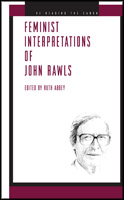“The Family as a Basic Institution”: A Feminist Analysis of the Basic Structure as Subject
 in Ruth Abbey (ed.), Feminist Interpretations of Rawls (Penn State Press, 2013).
in Ruth Abbey (ed.), Feminist Interpretations of Rawls (Penn State Press, 2013).
In Section 50 of Justice as Fairness: A Restatement, titled “The Family as a Basic Institution”, John Rawls replies to Susan Moller Okin’s feminist critique of A Theory of Justice. The question of how Rawlsian justice might secure gender equality has been discussed by many feminists, most notably by Okin. However, as I argue in this chapter, the Rawls-Okin debate raises more questions than it answers. Okin criticises Rawls for failing to apply his theory adequately to the family: she criticises not Rawls’s approach in general, but his attitude to the family in particular. Okin argues that a consistent application of Rawlsian theory would secure gender justice, but that Rawls is remiss in refusing such consistency. In fact, as I show, Rawls’s remarks on the family reveal a more fundamental problem with Rawlsian theory than Okin allows. It is not that Rawls fails to apply his theory correctly to the family, but rather that the specific case of the family illustrates deep-seated difficulties with Rawlsian justice as a whole.
The problem, to give an outline, is that Rawls’s ambiguous remarks on the family are comprehensible only at the expense of his fundamental claim that there is something distinctive about the application of justice to the basic structure. Okin criticises Rawls for failing to make good on the fact that the family is part of the basic structure. If he did make good, Okin claims, he would see that the principles of justice must apply to the family in a much more extensive way than he actually allows. As I show, however, the family is one illustration of the fact that how the principles of justice apply to an institution does not depend on whether that institution is part of the basic structure. This is a problem for Rawls because the distinctiveness of the basic structure is a crucial part of the political liberalism which, by the end of his work, has become essential to the Rawlsian project.
In this chapter I first outline Okin’s critique of Rawls in more detail, and provide a valid formalisation of her argument against Rawls. I then examine the main premises of her argument and look for evidence to support Okin’s interpretation of Rawls. I conclude that Okin’s interpretation is flawed but nonetheless highlights problems with Rawls’s claim that the basic structure is the subject of justice. I then consider and reject the argument that Rawls’s theory is consistent according to what I call the “whole structure view”: that the principles of justice apply to the basic structure considered as a whole. Finally, I consider G.A. Cohen’s argument that the basic structure distinction is problematic. I agree with Cohen’s criticism of the distinction, but suggest that Cohen is wrong in situating the problem with the issue of coercion. I conclude that Rawls’s position on justice in the family is at odds with his claim that the basic structure is uniquely the subject of justice.
You can see more about the book here.